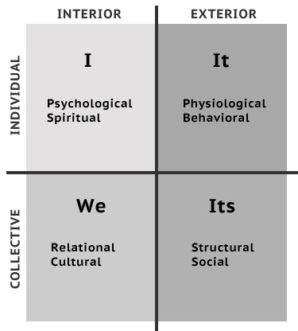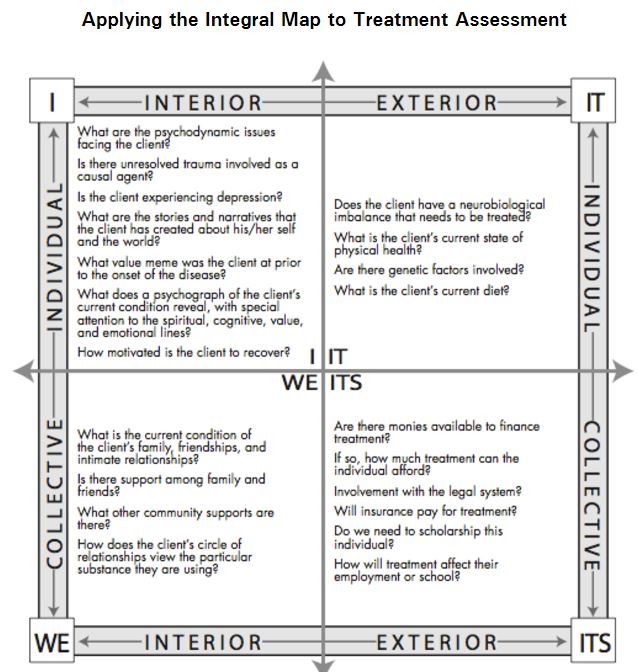Integral Recovery is a fairly new, holistic approach to recovery. One of its founders and the author of the award-winning book “Integral Recovery” (SUNY Press), John Dupuy will present a workshop on this beautiful pathway at the #NYSRecoveryCon on October 2nd. The following is a brief introduction to the Integral practice.
 Integral Recovery is rooted in holism and based on addressing the four quadrants of the Integral (or AQAL) map developed by American writer on transpersonal psychology, Ken Wilber. The model promotes a sophisticated system of personal development that engages body, mind, heart and spirit in daily practices designed to produce extraordinary health and awakening on all levels. When integrating these practices into daily life, one finds that overcoming the disease of addiction becomes the journey to creating their best selves.
Integral Recovery is rooted in holism and based on addressing the four quadrants of the Integral (or AQAL) map developed by American writer on transpersonal psychology, Ken Wilber. The model promotes a sophisticated system of personal development that engages body, mind, heart and spirit in daily practices designed to produce extraordinary health and awakening on all levels. When integrating these practices into daily life, one finds that overcoming the disease of addiction becomes the journey to creating their best selves.
Wilber, and his student, John Dupuy, begin by looking at recovery and addiction counseling through four different, possible lenses. We can view addiction and recovery from both objective and subjective perspectives, as well as on an individual vs. a collective basis. Thus laid out, the upper right-hand quadrant represents what empirical science can tell us objectively about the individual’s addiction (e.g., physical health and neurobiological imbalances). The lower right-hand quadrant, on the other hand, explores objective factors affecting the addicted individual’s collective adaptation, or life in the world (e.g., financial difficulties and legal involvements). If we move to the lower left-hand quadrant, there we find the intersubjective dimension (e.g., family relationships, as affected by the addicted individual’s behavior). Finally, we arrive at the upper left-hand quadrant, which addresses the interior, or subjective experience, of the addicted individual. [cite] Dr. Bob Weathers [/cite]
Dupuy credits his wife with identifying a simpler way to understand the quadrants (counter-clockwise from upper right) — my body, my self, my people, my world.
As an individual progresses in their daily practice, they find that the Integral approach is self correcting. It expects, encourages, and integrates change and evolution of the model as new information emerges. In fact, the model becomes more effective as it evolves.
In addition to individuals utilizing the integral map, treatment providers can also utilize it for both assessment and treatment plans as illustrated below.

Four Quadrant Treatment Assessment; Credit: Integral Recovery Institute
There is a great deal more to Integral Recovery than can be presented in this space. Those interested in learning more will find a wealth of resources including a weekly podcast, YouTube Videos, books, and more. In summary, a few of the benefits of using the Integral theory to promote Recovery as detailed in Dupuy’s book include:
- An encouraging and attractive model that emphasizes personal growth. The focus is not on “not using”, but rather on emotional, intellectual, and spiritual growth and physical well-being.
- Offers more complete accounting of the causes of addiction and points the way to how one can address those causes.
- Features deeper understanding of the internal mechanisms of healing, growth, and transcendence; and how they relate to the recovering individual.
- Provides framework with which to rationally examine and judiciously use a variety of treatment approaches, uniting multiple partial modalities into an integrated whole.
- Supplies skillful treatment and relapse prevention, teaching an individualized Integral Recovery Practice as the fundamental vehicle of the Recovery process.
- Presents a comprehensive and detailed map of the journey of recovery; one that’s inspiring, enlightening and immediately practical.
- The integral map enables us to understand the problem of addiction and how best to approach it, but more importantly, it helps us understand ourselves and our place in the world.
- The daily practices of Integral Recovery help to move the individual beyond sobriety to a lifelong journey of optimal health, self-actualization and ultimately self-realization.
For more on Integral Recovery, visit IntegralRecovery.com and be sure to meet John Dupuy at the NYS Recovery Conference in October.
